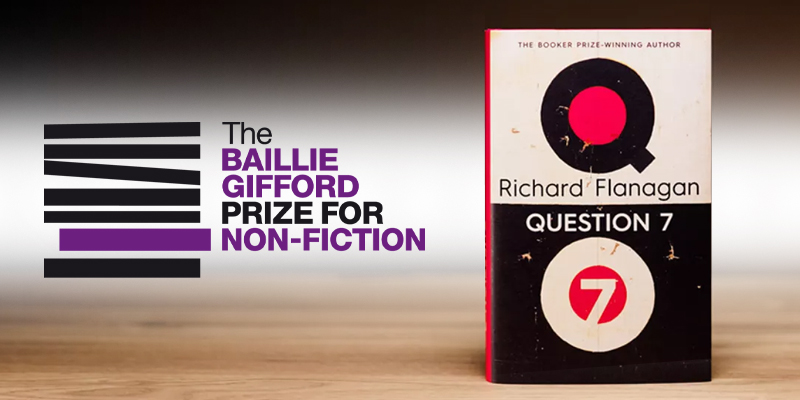
Richard Flanagan wins the Baillie Gifford Prize, but won't accept money without a plan to divest.
Out of an impressive shortlist, Richard Flanagan’s Question 7 has won 2024’s Baillie Gifford Prize for Non-Fiction. Flanagan’s wide-ranging memoir and history weaves together H.G. Wells and Rebecca West’s affair, pre-war nuclear physics, his father’s imprisonment near Hiroshima when the American atom bomb falls, and Flanagan’s own life-or-death experience on a raging river, and more. You can read an excerpt of the book, in which Flanagan visits the spot where his father was imprisoned in a Japanese internment camp, here.
Isabel Hilton, who chaired this year’s panel of judges, says of the winner:
Question 7 is an astonishingly accomplished meditation on memory, history, trauma, love and death—and an intricately woven exploration of the chains of consequence that frame a life.
In a year rich in remarkable books, Richard Flanagan’s Question 7 spoke to the judges for its outstanding literary qualities and its profound humanity. This compelling memoir ranges from intimate human relations to an unflinching examination of the horrors of the 20th century, reflecting on unanswerable questions that we must keep asking.
Flanagan, however, has rejected the £50,000 prize until the fund manager reduces its fossil fuel investments. He said he would welcome an opportunity to speak with Baillie Gifford’s board, to thank them and to “describe how fossil fuels are destroying our country,” reported The Guardian.
In a pre-recorded message, Flanagan thanked the firm and the Prize for what they do for literature, and then went on:
Yet my soul would be troubled if I did not say that the very rainforests and heathlands in which I am camped tonight, unique in the world, are existentially threatened by the climate crisis, and were I not to speak of the terrifying impact fossil fuels are having on my island home that same vanishing world that spurred me to write Question 7, I would be untrue to the spirit of my book.
So, becoming the beneficiary of Baillie Gifford’s generosity, it behooves me to give something in return to Baillie Gifford, something perhaps more valuable than money, a perspective that may otherwise be absent from their executive discussions. The world is complex, these matters difficult. None of us are clean. All of us are complicit. Major booksellers that sell my books are owned by oil companies, major publishers that publish my friends are owned by fascists and authoritarians. No one tonight should regard my words as criticism of Baillie Gifford, but its opposite. It is belief in Baillie Gifford’s good faith and the seeking of a way forward.
When we stumble, when we weary, it sometimes helps to have a friend to urge us on to our destination. I would welcome an opportunity to speak with Baillie Gifford’s board, both to thank them for their generosity and also to describe how fossil fuels are destroying my country. How, as each of us is guilty, each of us two bears a responsibility to act. A writer, a fund manager. I would urge Baillie Gifford to act on its own publicly stated conviction that it sees no future in hydrocarbons by sharing with the public a plan to reduce its already minimal direct investment in fossil fuel extraction and increase its investments in renewables.
In accepting this prize and the prize money that goes with it, I have a small caveat. I will delay taking receipt of the money until the day that plan is announced. And on that day, I will be grateful not only for this generous gift, but for the knowledge that by coming together in good faith, with respect and goodwill, it remains possible yet to make this world better.
Question 7 is about hope, how we must seize the day if we are to live. I thank you for the prize and the great honor that goes with it in the same spirit.
James Folta
James Folta is a writer and the managing editor of Points in Case. He co-writes the weekly Newsletter of Humorous Writing. More at www.jamesfolta.com or at jfolta[at]lithub[dot]com.



















